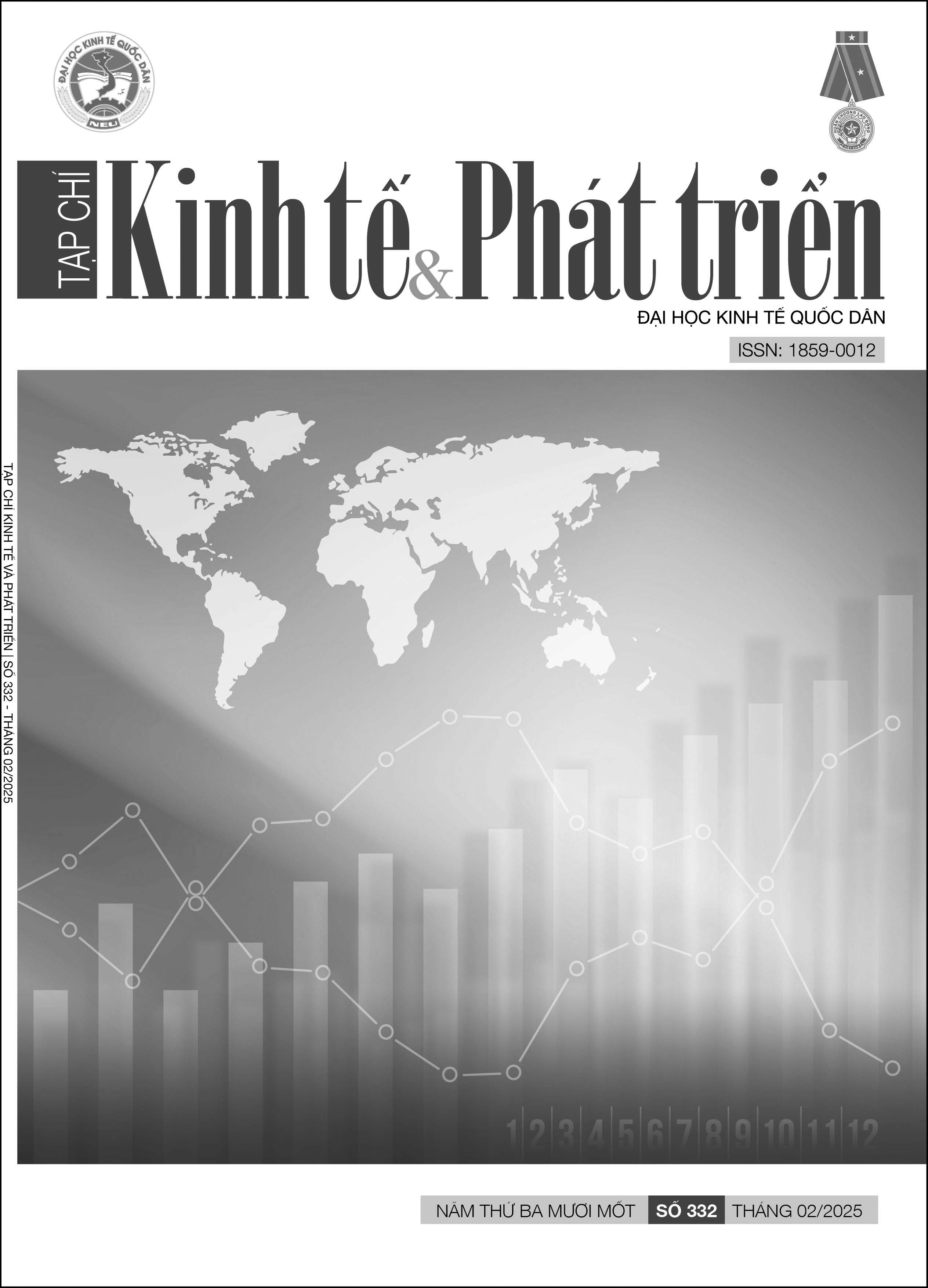Vai trò của quản trị nhà nước đối với phát thải CO₂: Nghiên cứu thực nghiệm và khuyến nghị cho Việt Nam
DOI:
https://doi.org/10.33301/JED.VI.2158Từ khóa:
Phát thải CO₂, GDP, trách nhiệm giải trình, hiệu quả quản trị nhà nước, chi tiêu công, pháp quyềnTóm tắt
Tại Việt Nam, phát thải CO₂ ngày càng gia tăng chủ yếu từ các ngành công nghiệp năng lượng, tốc độ đô thị hóa nhanh chóng và sự xuất hiện của các dự án hạ tầng lớn đã gây ra những hậu quả nghiêm trọng cho môi trường, kinh tế và xã hội. Nghiên cứu này khám phá sự tác động của GDP và các yếu tố thuộc quản trị nhà nước (chi tiêu công, trách nhiệm giải trình, hiệu quả quản trị nhà nước và pháp quyền) đến phát thải CO₂ tại Việt Nam. Nghiên cứu áp dụng phân tích định lượng với mô hình hồi quy tuyến tính cho dữ liệu của Việt Nam thu thập từ Ngân hàng thế giới trong giai đoạn 2010-2020. Kết quả nghiên cứu cho thấy GDP có tác động dương đến phát thải CO₂, chi tiêu công có tác động âm đến phát thải CO₂ và các yếu tố còn lại như trách nhiệm giải trình, hiệu quả quản trị nhà nước và pháp quyền không có tác động đến phát thải CO₂. Từ đó, nghiên cứu đề xuất một số khuyến nghị nhằm giảm phát thải CO₂ tại Việt Nam trong thời gian tới.
Tài liệu tham khảo
Atta, N., Sharifi, A. & Ying Lee, C. (2024), ‘The relationship between the rule of law and environmental sustainability: empirical evidence from the analysis of global indices’, International Journal of Sustainable Development & World Ecology, 31(8), 1023-1039. DOI: 10.1080/13504509.2024.2371159.
Azam, M., Khan, A., Abdullah, H. & Qureshi, M. (2016), ‘The impact of CO2 emissions on economic growth: evidence from selected higher CO2 emissions economies’, Environmental Science and Pollution Research, 23, 6376-6389. DOI: 10.1007/s11356-015-5817-4.
Boujedra, F., Jebli, M. & Aloui, A. (2024), ‘The effect of public funding and government effectiveness on CO2 emissions in developing countries: Evidence from panel quantile analysis’, Natural Resources Forum. DOI: 10.1111/1477-8947.12497.
Chen, J., Xian, Q., Zhou, J. & Li, D. (2020), ‘Impact of income inequality on CO2 emissions in G20 countries’, Journal of environmental management, 271, 110987. DOI: 10.1016/j.jenvman.2020.110987.
Dhrifi, A., Alnahdi, S. & Jaziri, R. (2021), ‘The causal links among economic growth, education and health: Evidence from developed and developing countries’, Journal of the Knowledge Economy, 12(3), 1477-1493. DOI: 10.1007/s13132-020-00678-6.
Eskander, S. & Fankhauser, S. (2020), ‘Reduction in greenhouse gas emissions from national climate legislation’, Nature Climate Change, 10, 750-756. DOI: 10.1038/s41558-020-0831-z.
Fowkes, D. (2019), ‘Identity: The Demand for dignity and the politics of resentment’, International Journal of Constitutional Law, 17(2), 714-717. DOI: 10.1093/icon/moz041.
Ghasemi, M., Rajabi, M. & Aghakhani, S. (2023), ‘Towards sustainability: The effect of industries on CO2 emissions’, Journal of Future Sustainability, 3, 107-118. DOI: 10.5267/j.jfs.2022.12.002.
Hiep, D. & Hoffmann, C. (2020), ‘A power development planning for Vietnam under the CO2 emission reduction targets’, Energy Reports, 6, 19-24. DOI: 10.1016/j.egyr.2019.11.036.
Htike, M.M., Shrestha, A. & Kakinaka, M. (2022), ‘Investigating whether the environmental Kuznets curve hypothesis holds for sectoral CO₂ emissions: evidence from developed and developing countries’, Environment, Development and Sustainability, 24, 12712-12739. DOI: 10.1007/s10668-021-01961-5.
Koçak, E. & Ulucak, Z.Ş. (2019), ‘The effect of energy R&D expenditures on CO 2 emission reduction: estimation of the STIRPAT model for OECD countries’, Environmental Science and Pollution Research, 26, 14328-14338. DOI: 10.1007/s11356-019-04712-2.
Kumar, A., Tiwari, A.K. & Milani, D. (2024), ‘Decarbonizing hard-to-abate heavy industries: Current status and pathways towards net-zero future’, Process Safety and Environmental Protection, 187(1), 408-430. DOI:10.1016/j.psep.2024.04.107.
Minh, T.B., Ngoc, T.N. & Van, H.B. (2023), ‘Relationship between carbon emissions, economic growth, renewable energy consumption, foreign direct investment, and urban population in Vietnam’, Heliyon, 9(6), 1-9. DOI:10.1016/j.heliyon.2023.e17544.
Ngoc, B.H., Tram, N.H.M. & Lieu, P.T. (2023), ‘Does the underground economy promote resource depletion and environmental pollution in Vietnam?’, VNU Journal of Economics and Business, 3(3), 20-29. DOI:10.57110/jebvn.v3i3.224.
North, D.C., Wallis, J.J. & Weingast, B.R. (2009), Violence and social orders: A conceptual framework for interpreting recorded human history, Cambridge University Press. DOI:10.1086/ahr.117.2.484.
Oyewo, B., Tauringana, V., Tawiah, V. & Aju, O. (2024), ‘Impact of country governance mechanisms on carbon emissions performance of multinational entities’, Journal of Environmental Management, 352, 1-20. DOI: 10.1016/j.jenvman.2023.120000.
Phong, L., Van, D. & Bao, H. (2018), ‘The Role of Globalization on CO2 Emission in Vietnam Incorporating Industrialization, Urbanization, GDP per Capita and Energy Use’, International Journal of Energy Economics and Policy, 8, 275-283. DOI:10.32479/ijeep.7065.
Pollitt, C. & Bouckaert, G. (2017), Public management reform: A comparative analysis—Into the age of austerity, 4th ed., Oxford University Press.
Rajkumar, A.S. & Swaroop, V. (2018), ‘Public spending and outcomes: Does governance matter?’, Journal of Development Economics, 86(1), 96-111. DOI: 10.1016/j.jdeveco.2007.08.003.
Rasheed, M. & Liu, J. (2024), ‘Unraveling the environmental Kuznets curve: interplay between CO 2 emissions, economic development, and energy consumption’, Environmental Science and Pollution Research, 31(9), 13372-13391. DOI:10.1007/s11356-023-31747-3.
Ronaghi, M., Reed, M. & Saghaian, S. (2020), ‘The impact of economic factors and governance on greenhouse gas emission’, Environmental Economics and Policy Studies, 22, 153-172. DOI: 10.1007/s10018-019-00250-w.
Tawiah, V., Zakari, A. & Alvarado, R. (2024), ‘Effect of corruption on green growth’, Environ Dev Sustain, 26, 10429-10459. DOI: 10.1007/s10668-023-03152-w.
Taylor, R. & Kelsey, T. (2016), Transparency and the open society: Practical lessons for effective policy, Policy Press. DOI:10.46692/9781447325376.
Thi, H., Thi, K., Phuong, D., Thu, V. & Minh, C. (2020), ‘Impact of Environmental Tax Collection on CO2 Emissions in Vietnam’, International Journal of Energy Economics and Policy, 10(6), 299-304. DOI: 10.32479/ijeep.10153.
World Bank (2020), World development report 2020: The role of governance in development, World Bank Publications, retrieved on December 12th 2024, from <https://openknowledge.worldbank.org/server/api/core/bitstreams/bd24e4f5-41d8-5bde-a8bf-a0e42581af15/content>.
World Bank (2023), Vietnam: Carbon intensity reduction policies and accountability, Washington, DC: The World Bank Group, retrieved on December 12th 2024, from <https://www.worldbank.org/>.





